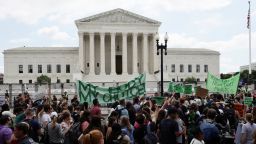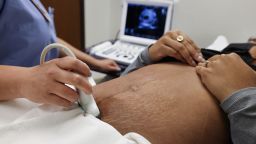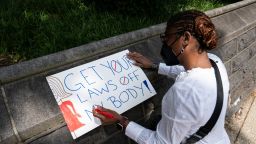Kollene Dunn’s abortion a few months after the Supreme Court’s 1973 Roe v. Wade ruling saved her family, she said.
Dunn learned she was pregnant from a date rape and her mind quickly raced to her two young children, she told CNN. The single mom realized she did not have the economic means to support a third child on her income as a secretary.
“Roe v. Wade saved me and my two children,” said the resident of Otis, Oregon. “My life would have been so different had I not been able to get a legal abortion.”
Dunn, now 79, fears the economic impacts overturning Roe v. Wade will have on women who are already in tough economic situations, especially women of color, she said. On top of economic hardships, Black women are three times more likely than White women to die of pregnancy-related complications, according to the CDC.
The Supreme Court overturned Roe v. Wade on Friday in its most consequential decision in decades. The move will change women’s reproductive rights in the United States, leaving the decision up to each state, unless Congress acts.
“This is an earthquake that’s happening to our society, and it didn’t need to happen,” Dunn said Friday afternoon, reading the ruling on her laptop in her living room.

“It was enough to just make me sick,” she said. “The rights that we’ve had, we’re going to not have anymore, and it doesn’t stop here. It’s terrible.”
Roe v. Wade is “part of the larger story of personal freedom,” Dunn said, and a woman’s right to make decisions about her body is still her top issue politically.
Dunn was a single 18-year-old when she had her first child, she said. She later got married and had her son in 1970.
She had recently separated from her husband when she said she was date raped in 1973 by a man she had gone out with a few times.
“When I found out I was pregnant, it was like, horrifying,” she recalled. “It was like, ‘Oh, my God, what am I going to do? I can’t do this.’”
The decision weighed heavily on Dunn. How would she feed three children? How would she pay the rent? Could she keep her full-time job? And could she afford a babysitter?

“But by child number three, I’m thinking I can barely make it with two. I can’t do this,” Dunn said. “It would be very impactful for my children and very negatively because I wouldn’t be able to feed them as well as I did or house them as well as I did.”
The decision to terminate the pregnancy was the right one for her and her family, Dunn said, after considering her options. Even if she’d had to get an abortion illegally, she said she would have done so.
“I was just really grateful that it was at a time when I could have a legal abortion in a doctor’s office and that it would be OK,” she said.
Dunn now worries about the next generations of people who may need to get the critical procedure, she said, including her own grandchildren and great-grandchildren.
“I just feel so bad,” she said, for the younger women in the country.





Comments